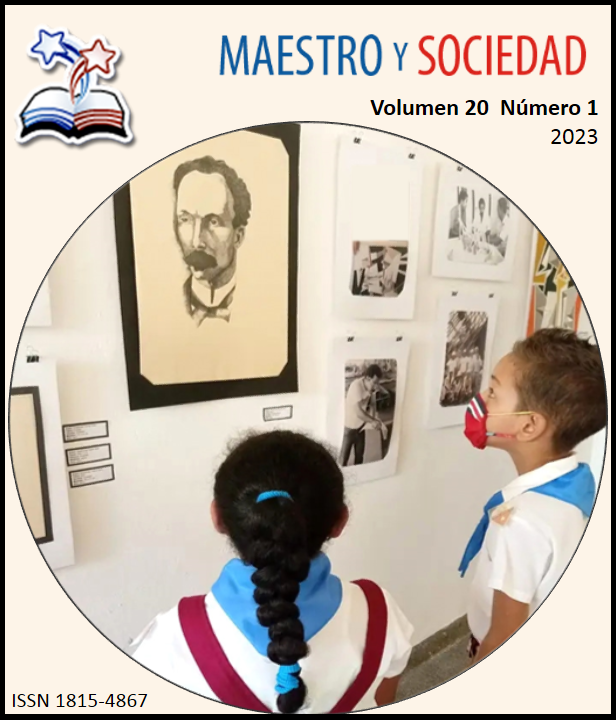Methodology for analyzing literary text y pregraduates training for Spanish- Literature future professors
Methodology for analyzing literary text y pregraduates training for Spanish- Literature future professors
Keywords:
methodology, analysis of literary texts, undergraduate trainingAbstract
Introduction: The present work has the purpose of addressing a methodology for the analysis of literary texts in the Bachelor of Education Spanish-Literature career, which favors the solution of insufficiencies in the didactic procedures for the analysis of literary texts in the Bachelor of Education Spanish Literature career.
Materials and methods: Some theoretical and empirical methods were used, such as: historical-logical and inductive-deductive and structural-functional systemic.In addition, techniques such as surveys, interviews, documentary study, class observation, pedagogical tests, consultations with specialists and professional reflection workshops were used.
Results: A methodology based on a didactic orientation model for the analysis of the literary text is designed, which integrates the discursive-functional method and the planes of the literary text in the discursive-functional-compositional structuring procedure of the literary text. Discussion: The application of the stages of the methodology and the procedure favors the theoretical-didactic preparation of the pedagogical group and the integral formation of the students of the career.
Conclusions: The practical realization of the methodology, structured in three stages, favors the transformation of the initial state of the analysis of the literary text in the undergraduate training of the Spanish-Literature teacher.
References
Álvarez de Zayas, C.M. (1999). La escuela en la vida. Editorial Pueblo y Educación.
Castellanos, D. et.alt. (2001). Aprender y enseñar en la escuela. Una concepción desarrolladora. Editorial Pueblo y Educación.
Cisneros, S. (2009). Modelo didáctico de la comprensión de textos escritos desde una perspectiva lingüístico-pedagógica. Memorias del Congreso Internacional de Pedagogía 2009.
Del Valle, A. (2012). La investigación pedagógica. Otra mirada. Editorial Pueblo y Educación.
Figueroa-Corrales, E. (2020). La comprensión de textos desde una perspectiva audiovisual. Editorial Académica Española URL: https://www.eae-publishing.com/
Figueroa-Corrales, E. (2021). Lectura del texto cinematográfico en la sociedad hipermedial. Revista Didáctica, XXI(24). http://www.ampll.org.mx/eventos.html
Gell, A. (2003). La construcción de textos escritos: Su desarrollo en los escolares de tercer y cuarto grados de la escuela rural. [Tesis de doctorado. Instituto Superior Pedagógico Frank País García].
Horrutinier, P. (2006). La universidad cubana: el modelo de formación. Editorial Pueblo y Educación.
Labarrere, G. y Valdivia, G. (1988). Pedagogía. Editorial Pueblo y Educación.
Mañalich, R. (2007). La enseñanza del análisis literario: Una mirada plural. Editorial Pueblo y Educación.
Roméu, A. (2007). El enfoque cognitivo, comunicativo y de orientación sociocultural. Editorial Pueblo y Educación.
Downloads
Published
How to Cite
Issue
Section
License
Copyright (c) 2023 Liette Gámez Rodríguez, Yoandra Fontanills Gimeno, María Luz Rodríguez Cosme, Omar Rosabal Landrón

This work is licensed under a Creative Commons Attribution-NonCommercial-NoDerivatives 4.0 International License.
This journal provides immediate open access to its content, based on the principle that offering the public free access to research helps a greater global exchange of knowledge. Each author is responsible for the content of each of their articles.



























 Universidad de Oriente
Universidad de Oriente 